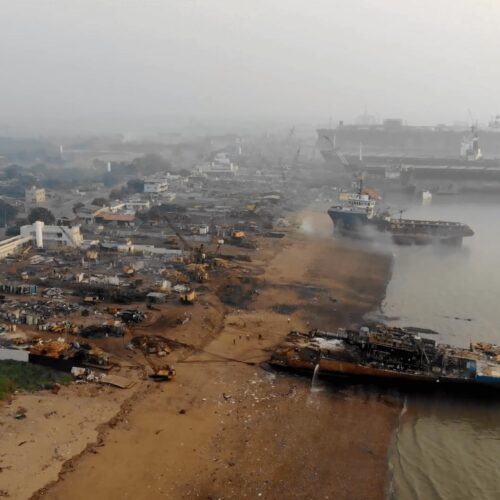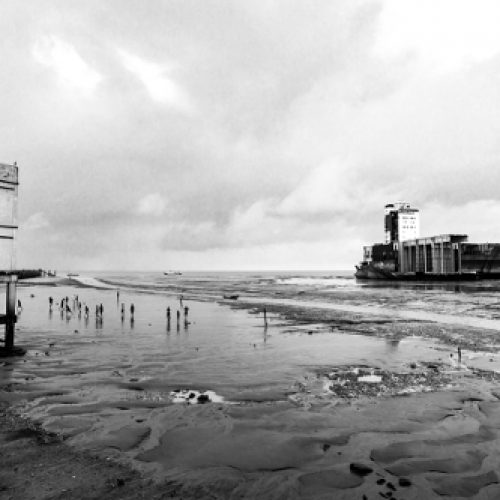Platform News – Indian NGOs voice concerns as ship owners promote beaching
Indian NGOs voice serious concerns regarding the beaching of end-of-life vessels in Alang in reaction to the recent visit to the Alang shipbreaking yards organised by ECSA (European Community Shipowners’ Association). Late in April, the European ship owners had invited government representatives from France, Germany and Belgium, as well as the European Commission to a promotional tour of Alang. NGOs, including the NGO Shipbreaking Platform and its Indian members, were not allowed to join the visit. Additionally, ECSA did not take the time to meet with the local trade union or the affected workers themselves.

Indian NGOs are concerned about the negative environmental impact of dismantling end-of-life vessels in the intertidal zone where large amounts of debris, including toxic paint chips, are released, accumulate in the environment and are washed out by the tide. Moreover, the secondary cutting areas, which have been concreted in some of the beaching yards, show cracks in the surface, which raises doubts as to whether they can qualify as impermeable floors.
Local environmental groups have submitted letters to the European Commission highlighting pollution caused by the beaching method, the lack of transparent and adequate downstream management, as well as labour rights violations. The letters sent by Gujarati NGOs Paryavaran Mitra and Machimar Adhikar Sangarsh Sangstha welcome that the EU has taken “a strong stance against the continued acceptance of breaking ships directly on the beach”, a practice which is banned in other parts of the world, as the local environmentalists argue.
ECSA and its members have found a convenient solution in referring to the Hong Kong Convention (HKC), an IMO Convention that is unlikely to enter into force any day soon: the HKC does not ban the beaching method and it does not introduce strict rules on downstream waste management. Moreover, anyone can hand out Statements of Compliance (SOCs) to shipbreaking yards claiming they operate in line with the convention. While some certifiers act with more diligence, others have started to offer cheaper and quicker certifications. It is expected that many yards will soon hold a HKC compliance certificate. This is a development similar to ISO 30.000, for which most yards in India and Bangladesh were quick to produce certificates, rendering the standard meaningless.

Related news

Press Release – Fire on board Greek tanker kills two shipbreaking workers in Bangladesh
Md Jamil and Bipul lost their lives while scrapping Polembros’ vessel Greek Warrior.
... Read More
Platform News – SAVE THE DATE: “With Bare Hands” on 3 October 2019 in Brussels
The NGO Shipbreaking Platform invites you to attend the conference With Bare Hands on Thursday 3 October in Brussels (Belgium).
... Read More
Platform News – Prison sentence for attempted illegal export of the Harrier reveals reckless actions by all parties involved
The judgment, now available in English, provides shocking insights into the role played by all parties involved in the sale and transport of the end-of-life vessel.
... Read More
Press Release – Another worker dies at Alang shipbreaking yard
Just weeks before the Hong Kong Convention (HKC) for the Safe and Environmentally Sound Recycling of Ships is set to enter into force on 26 June,… Read More

Press Release – NGO publishes 2015 list of all ships dismantled worldwide
Read our country-specific press releases: Belgium and France | Brazil and Portugal | Germany | Greece | Italy | Japan | Spain Read what the North… Read More

Platform News – EU ship recyclers join voices to promote clean and safe practices
Five European ship recycling yards announced yesterday that they have joined forces to effectively raise awareness of existing best practice and the fact that there is capacity… Read More


